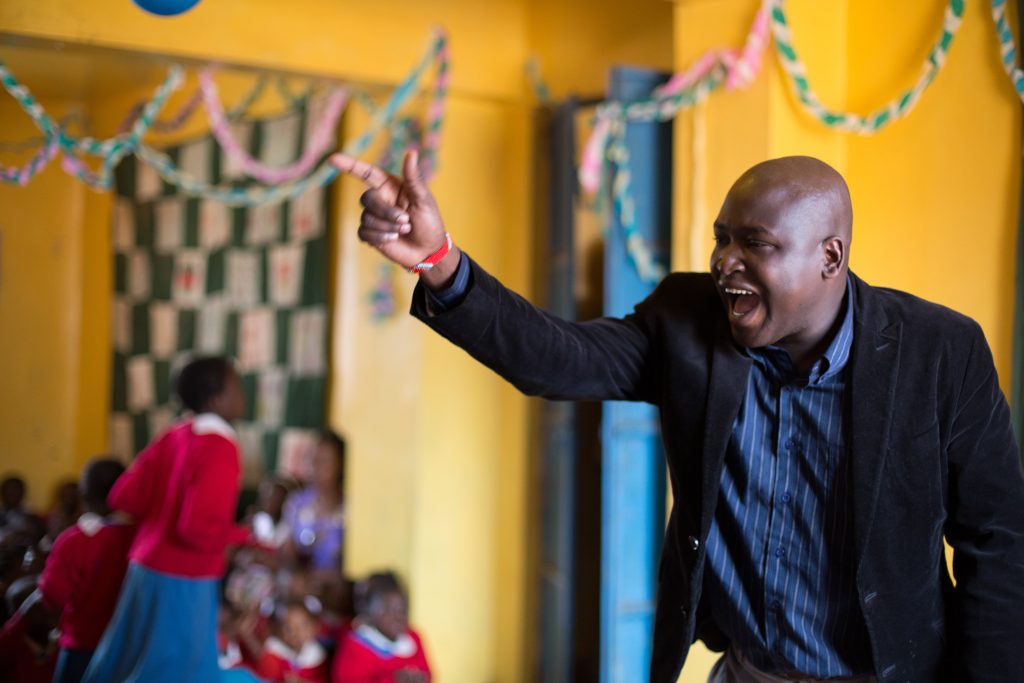Welcome to Part 1 of our April 2025 Inspirational Interview with Kennedy Odede.
Kennedy Odede is the Founder and Chief Executive Officer of Shining Hope For Communities (SHOFCO), Kenya’s largest community-based organisation, and one of Africa’s most esteemed social entrepreneurs. He is best known for his award-winning work to transform the lives of slum residents and direct resources and decision-making power to local community organisations. Kennedy was named in the TIME100 list of the world’s most influential people in 2024, as Schwab Foundation’s Social Entrepreneur of the Year. He holds a Bachelor’s degree in Sociology from Wesleyan University.
Part 2 of Kennedy’s interview will be published 7 April 2025.
All pictures are courtesy of SHOFCO.
![]()
1. How and why did you join the movement to end violence against women (VAW)?
Growing up in Kibera, I was surrounded by deep gender inequality. I was inspired by women like my mother, who showed me the power of resilience and perseverance. Her experiences influenced me to place gender equality and women’s empowerment at the centre of what we do through SHOFCO’s programming.
2. You founded Shining Hope For Communities (SHOFCO) in 2004 with “passion, 20 cents and a football”. In 2007, you met Jessica Posner with whom you partnered to pioneer the approach that SHOFCO uses today. Could you tell us how SHOFCO has developed since its early years?
SHOFCO has come so far in the past 20 years. We have grown from a group of people in Kibera, speaking about the challenges in the community and devising solutions, to a nationwide movement impacting 2.4 million people. Our holistic approach delivers best-in-class services, ranging from health and education to economic and social empowerment programs. These services are informed by our community advocacy platforms, which equip individuals with the knowledge and skills to seek tangible change in their community and broader society. What has never changed over the years is our community-driven approach–our work has and will always be needs-driven and informed by the people we serve.
3. Part of SHOFCO’s groundbreaking work is rooted in the SHOFCO Urban Network which was formalised as a community-led advocacy platform to bring together individuals and households through social groups and organises them to actively seek tangible change in their community and society at large. Could you tell us about how SHOFCO empowers women and girls through community-based services and programmes?
SHOFCO addresses gender inequalities in society by transforming mindsets, safeguarding women and girls, and embedding inclusion across all our programs. The SHOFCO Urban Network itself is 60% women, and this community-led model informs our services and programmes.
We operate safe houses for survivors of violence against women, as well as offer legal assistance, mental health counselling, and group therapy. We work from the community level, through awareness and empowerment initiatives, training leaders to recognise and respond to abuse. Women and girls’ empowerment is integrated across every level of SHOFCO’s work.
Our health clinics prioritise preventative care and family planning services. We link VAW survivors to our Sustainable Livelihoods programmes, where they receive entrepreneurship and jobs skills training, reducing financial dependence. Through our SHOFCO Women’s Empowerment Program (SWEP), we empower women by providing job readiness, entrepreneurship, and vocational training, alongside internship and job placement opportunities.
Additionally, we offer shared facilities where women can create products for sale to generate income. We enhance women’s access to loans and savings through the SHOFCO SACCO. And, our tuition-free leadership academies empower the next generation of Kenyan women leaders.
4. SHOFCO believes that “girls are the key to long-term change that will break cycles of poverty” in slum communities and runs two tuition-free leadership academies where more 600 girls are receiving an excellent education from kindergarten to the 8th grade to give them a good start in life and to encourage them to follow their dreams of someday becoming professionals like doctors and journalists. What sort of impact has SHOFCO’s girls’ education programme had since it began and has it helped reduce VAW in the communities the schools serve?
Within informal settlements, girls face significant barriers to education, including a lack of access to quality healthcare and resources. This prevents many from staying in school, leading to lower earning potential, higher risks of contracting HIV, and poorer health outcomes for their children. Additionally, the undervaluing of women and girls means that the most vulnerable may never start school at all. SHOFCO opened our two tuition-free schools to combat these issues and provide transformative, leadership-based education to young girls in slum communities.
Our schools serve as models of excellence, with students consistently outperforming national averages. Many graduates go on to attend prestigious high schools and universities, contributing to a more equitable future. Through leadership development, life skills training, and community service projects, our students are equipped to become agents of change in their communities. Our schools have a 98% daily attendance rate, with 100% matriculation to secondary school. 75% of SHOFCO students go on to attend university, either in Kenya or internationally.
5. What are some of the particular challenges that SHOFCO has faced and continues to face when tackling VAW in Kenya?
Women and girls living in informal settlements are even more likely to suffer from GBV due to harmful gender norms, such as female genital mutilation and early marriages. This issue was exacerbated during the COVID-19 pandemic–SHOFCO’s Gender Department saw a 289% increase in reported cases during the peak of the pandemic. Women who lost jobs and earnings became completely dependent on their husbands or partners, and girls were home from school for an extended period. These challenges continue, and it is essential that we work to continue shifting cultural mindsets around gender norms, which happens from a community level.
